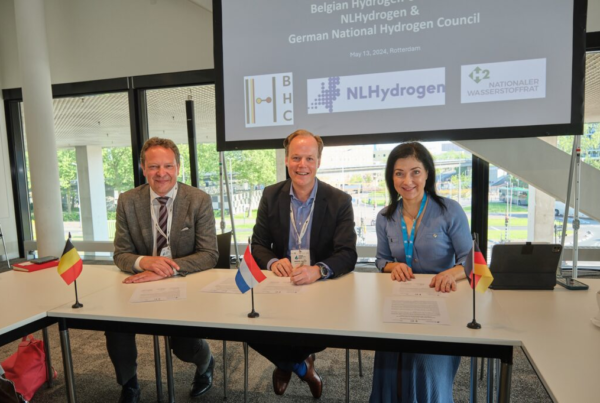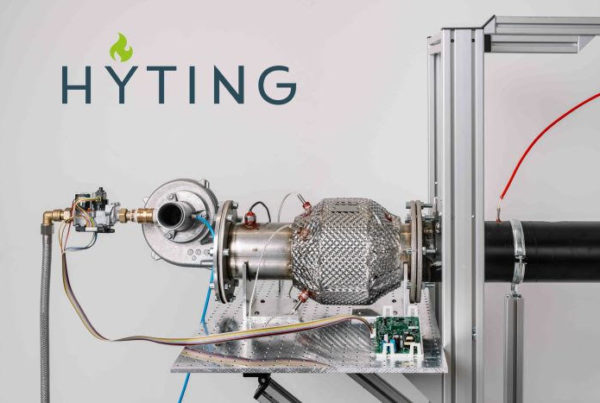
Singapore’s Horizon Fuel Cell group has officially launched Hyzon Motors, a hydrogen vehicle company, which will initially focus on the development of zero-emission heavy-duty vehicles.
By Harry Morgan for Rethink Technology Research
The company will aim to rush its early truck models to market immediately, to give itself a Tesla-style advantage as hydrogen infrastructure develops in emerging markets.
Under the Hyzon brand, Horizon launched its first fuel-cell electric vehicles in January this year, with semi-prototype trucks available for Australian consumers. The venture will aim to leverage the experience of Horizon Fuel Cells as a supplier to vehicle suppliers to bring further hydrogen-powered trucks and buses to the market this year. Hyzon has looked to follow Tesla’s approach of aggressive commercialization as part of the company’s attempt to become an early leader in green logistics.
While the company has signaled ambitions of providing fuel cells for a wide range of vehicles, Hyzon’s inaugural hydrogen fuel cell vehicle line will include trucks from 15 tons to 40 tons, powered by fuel cell stacks between 100 kW and 200 kW. This line is set to enter the market in November this year, although stacks of 370 kW are in planning for use in 140-ton road-trains, for commercialization in 2021.
Demands for individual trucks are highly dependent on their specific payloads and requirements. The company claims that fuel efficiency can vary between 3 and 12 kilometers per kilogram, with its standard range of trucks expected to offer 500 kilometers of range with 48 kilograms of hydrogen, up to 2,000 kilometers with 192 kilograms.
Hyzon itself is incorporated in New York, US, but the early focus will be placed on markets in Australia and New Zealand, due to their superior hydrogen infrastructure and current market opportunities. In conversation with Rethink, Hyzon CCO Brendan Norman cited the regions’ mining pedigree and plans to overhaul fossil-fuel produced hydrogen feedstocks with green hydrogen, as a key driver for using the countries as incubator markets for fuel-cell-powered fleets.
These mineral companies, as well as several concrete companies, are primary targets for Hyzon, with excess hydrogen production also providing the potential to reduce emissions in fleet transportation and logistics.
Refueling locations will, therefore, be initially collocated with these industrial facilities, providing a back-to-base platform for fueling companies’ fleets of heavy-duty vehicles. However, with an aggressive push for commercialization, Hyzon hopes to create a network of industrial players across each market which players can share for long-haul logistics.
The company also highlighted that once a green hydrogen refueling station is developed at an industrial plant, local interest also increases, attracting attention from other companies for additional fleets of buses and trucks.
While most of the benefit of hydrogen fuel cell vehicles is seen when green hydrogen is used, the existing hydrogen economy in Australia means that the scaling of electrolyzer capacity in the country will not fully restrict Hyzon’s market opportunity. However, the company has highlighted that most of the 10 deals that it has signed so far have entailed a green hydrogen fuel supply, with Australia racing to become a world leader in the sector.
Australia looks set to be Japan’s largest competitor for the largest green hydrogen market in the Asia-Pacific region, with Siemens backing a 5 GW solar + wind Murchison project in the country’s West, aiming to deploy its own Silyzer electrolyzers.
The fact that Hyzon is so keen to rush its trucks to market is, therefore, a push to stimulate the growth of the hydrogen network in the Australian market, as an early proof of concept before turning its attention elsewhere. The company is expected to announce a partnership with a “world-leading” IT company, to use telemetry to monitor and optimize the performance of its vehicles and extend its lead in the early market – much as Tesla has done in the battery-electric market.
The company claims that it will have 900 ready-to-go fuel-cell trucks within the next three years, but hopes to push deployment to over 2,000 units. By this time, Hyzon believes that its vehicles will be close to parity with those currently used within logistics, in terms of cost, charging time and range.
At its US facility, the company aims to increase production capacity to 10,000 units, as it addresses other global markets. While the company is currently active in the US, China, and Malaysia, Norman indicated that the company is receiving interest and exploring options across Europe, where excitement around green hydrogen production continues to ramp up.
The company will take over an integration facility for fuel cells in New York from General Motors, which dropped the plant as part of austerity measures. Following this, Hyzon Motors will be the first US-based manufacturer of PEM fuel cell modules that exceed 100 kW in capacity. These cell stacks operate with a weight power density of over 4 kW per kg, using dry hydrogen as a feedstock to provide electricity as it passes through the cells.
With Hyzon’s fuel cells operating at over 47% efficiency, the use of fuel cells provides a significant advantage over burning hydrogen directly, where thermodynamic limits define an upper limit of around 40%. The company also claims that its fuel cells are well equipped for a 1 million kilometer lifespan and that simple maintenance means that they can be refurbished and resold with ease.
Rather than adopting Nikola’s tactic of building up a truck manufacturing business from the ground, Hyzon will partner with existing makers. Norman claims that a deal will be announced soon, although did not specify which player would be the first to partner with the technology. Hyzon has also partnered with tech companies to develop its suspension kinetic energy system which can recover energy from road undulations to improve the efficiency of its fuel cell systems.
Nikola is likely to be one of Hyzon’s largest competitors, although it also faces a landgrab battle with Tesla for smaller vehicles. This week Toyota also announced that it would partner with Hino Motors to jointly develop a similar zero-emission heavy-duty truck.
Some players are experimenting with battery-electric trucks, but it’s unlikely that battery technology will make it that far up the automotive chain. The increased energy density of hydrogen fuel cells allows for longer range, with less constraint around the physical space used to store the hydrogen. Refueling also adopts a much more similar format to traditional vehicles, eliminating the need for long charge times, with Hyzon claiming that the technology provides “a significant advantage in whole-of-life cost.”
In a press release earlier this month, Horizon Fuel Cell Chairman, George Gu, who has taken the position of CEO of Hyzon Motors, stated that “We have seen incredible growth in Asia in recent years at Horizon, and now with the experience gained from hundreds of
trucks in commercial service, we aim to bring our technology to the roads of the world. Our Fuel Cell systems have already proven themselves, and we see an opportunity to help the world decarbonize transport much faster than people currently believe is possible.”
Hyzon Motors will have an alternate shareholding to the Horizon Fuel Cell Group, although the latter will retain a significant stake in the new venture. Horizon was launched in 2003, with the production of PEM fuel cell stacks commencing the following year.
Source: Reprinted by permission of Rethink Technology Research
By Harry Morgan for Rethink Technology Research
Original Article: Hyzon Aims for Tesla-Style Rush to Market for Hydrogen Trucks
Read the most up to date Fuel Cell and Hydrogen Industry news at FuelCellsWorks




